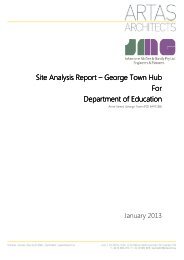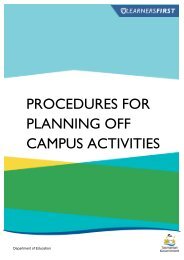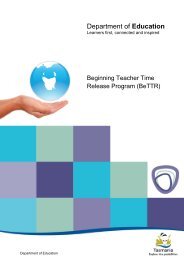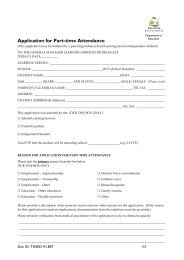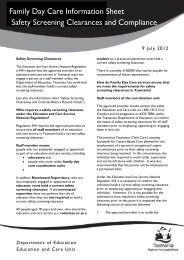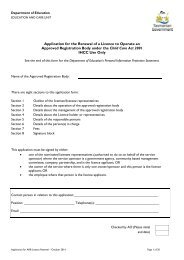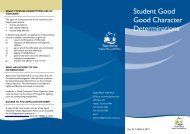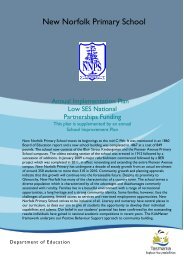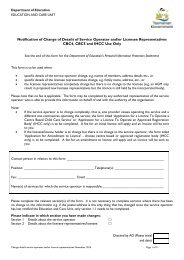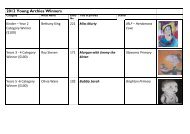Education
DoE Annual Report 2012-2013 - Department of Education
DoE Annual Report 2012-2013 - Department of Education
- No tags were found...
You also want an ePaper? Increase the reach of your titles
YUMPU automatically turns print PDFs into web optimized ePapers that Google loves.
Employee Performance and Development Programs<br />
This section describes the department-wide approach to managing performance and the provision of professional learning.<br />
Performance management<br />
The State Service Amendment (Performance) Act 2011, and<br />
Employment Direction No 26: Managing Performance<br />
in the State Service, require all agencies to implement a<br />
performance management system to facilitate the effective<br />
performance of employees.<br />
Throughout 2012, significant work was undertaken to<br />
develop a new performance management framework<br />
to replace the previously diverse range of performance<br />
management systems which had been in operation across<br />
the department since 2010. The new framework has<br />
been designed to ensure a consistency of approach to<br />
performance management throughout the department,<br />
and to ensure a structured and formal approach to<br />
performance management which fulfils all requirements<br />
of the Act and the Employment Direction.<br />
The new framework was established following an<br />
extensive consultation process. Reference groups<br />
incorporating school principals, K–12 teachers, school<br />
executive officers, Polytechnic staff and all non-school<br />
workplaces were conducted around the state.<br />
The Australian <strong>Education</strong> Union, Community and<br />
Public Sector Union, United Voice and Tasmanian Principals<br />
Association were also consulted throughout<br />
the development of the new arrangements.<br />
In September 2012, the department introduced the<br />
Performance and Development Framework, with formal<br />
implementation commencing in January 2013 following<br />
extensive communication to employees and the provision<br />
of formal training to managers.<br />
The Performance and Development Framework applies to all<br />
permanent employees (teaching and non-teaching) and<br />
all fixed-term non-teaching employees employed for a<br />
period greater than six months. Separate performance<br />
management arrangements apply to fixed-term teaching<br />
staff and probationary employees.<br />
The Performance and Development Framework includes a<br />
formal Policy, Performance and Development Procedure<br />
and Managing Underperformance Procedure. The key<br />
features of the framework include:<br />
• establishment of strong linkages and alignment<br />
between departmental strategic drivers and values,<br />
school and workplace improvement priorities and<br />
individual employee goals<br />
• the requirement for every employee to participate<br />
in formal performance management discussions with<br />
their manager to establish performance improvement<br />
goals, outcomes and measures of success, and<br />
professional development goals<br />
• documentation of the agreed outcomes of these<br />
discussions in the form of a Performance and<br />
Development Plan (PDP)<br />
• formal assessment of performance annually against a<br />
three-tier assessment model<br />
• early intervention and structured management of<br />
underperformance<br />
• alignment with the Australian Professional Standards<br />
for Teachers as the benchmark standard for teacher<br />
performance<br />
• introduction of Capability and Values Profiles and<br />
professional standards as the basis for establishing<br />
improvement goals and assessing performance.<br />
The department's Learners First Strategy provides<br />
the strong foundation for the new Performance and<br />
Development Framework. The key strategic drivers of ‘an<br />
innovative workforce’ and ‘inspired leadership’ provide the<br />
links to the new performance management arrangements,<br />
where the focus is on supporting a culture of effective<br />
performance and continuous improvement.<br />
The new performance management arrangements are<br />
also strongly linked to the department’s values of learning,<br />
excellence, equity, respect and relationships. The values<br />
are an integral part of the performance conversations<br />
and goal setting, and the values are directly reflected in<br />
the Capability and Values Framework and the professional<br />
standards that have been developed to support the new<br />
performance management arrangements.<br />
The performance management arrangements also create a<br />
strong alignment with the State Service Code of Conduct<br />
and State Service Principles. Employee responsibilities in<br />
accordance with these requirements and principles are<br />
an inherent part of the framework, and the Capability and<br />
Values Framework ensuring all employees are aware of, and<br />
assessed against, these responsibilities.<br />
The Australian Professional Standards for Teachers form<br />
the foundation for the establishment of performance<br />
improvement goals and assessment for teaching staff.<br />
The focus of performance management for teachers is on<br />
improving the overall quality of the teaching in Tasmanian<br />
schools and these professional standards describe the core<br />
aspects of quality teaching. The department’s Professional<br />
Learning Institute has a key ongoing role in delivering<br />
on identified professional learning needs to enhance<br />
quality teaching.<br />
For non-teaching staff, a Capability and Values Framework has<br />
been developed. This framework describes the standard<br />
of work and behaviour required at each classification level<br />
and for each type of work, and includes separate profiles<br />
for each Tasmanian State Service award classification band<br />
and for education facility attendants. This framework has<br />
been further expanded to include a range of professional<br />
standards and capability profiles for school psychologists,<br />
speech and language pathologists and social workers, which<br />
describe the standards of professional practice required of<br />
employees in these professional roles.<br />
The introduction of the framework has been supported by<br />
formal structured training for all managers, online training<br />
for employees and significant ongoing implementation<br />
support.<br />
Formal workshops have been delivered for all managers<br />
responsible for leading performance conversations<br />
and developing PDP’s with employees. The workshops<br />
were designed to ensure all managers became familiar<br />
with the new arrangements and to provide them with<br />
the knowledge and skills to effectively undertake their<br />
performance management responsibilities. These<br />
workshops were designed and delivered in conjunction<br />
Required Reporting » Employee Performance and Development Programs<br />
67



